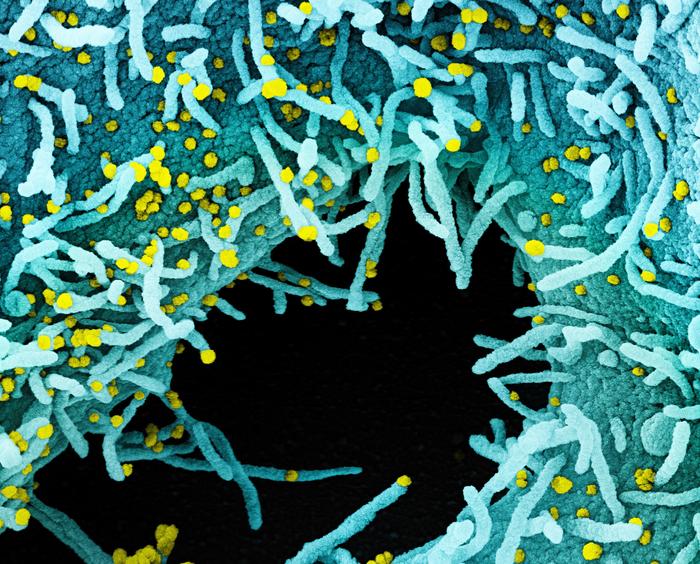WHAT:
Receiving a COVID-19 mRNA vaccine or booster during pregnancy can benefit pregnant people and their newborn infants, according to findings recently published in Vaccine. The paper describes results from the Multisite Observational Maternal and Infant Study for COVID-19 (MOMI-VAX), which was funded by the National Institute of Allergy and Infectious Diseases (NIAID), part of the National Institutes of Health.

Credit: NIAID
WHAT:
Receiving a COVID-19 mRNA vaccine or booster during pregnancy can benefit pregnant people and their newborn infants, according to findings recently published in Vaccine. The paper describes results from the Multisite Observational Maternal and Infant Study for COVID-19 (MOMI-VAX), which was funded by the National Institute of Allergy and Infectious Diseases (NIAID), part of the National Institutes of Health.
The MOMI-VAX study launched in June 2021 when data on COVID-19 vaccination in pregnant people were sparse. Researchers hoped to understand the immune response following receipt of Pfizer and Moderna COVID-19 vaccines, and determine how much protection against illness they provided. Pregnant people are more likely to be hospitalized and die from severe COVID-19, and the disease puts them at greater risk for preterm birth. Researchers also suspected that, as with other vaccines, the antibodies generated by COVID-19 vaccination might transfer to fetuses across the placenta, which would provide newborns with some additional protection against COVID-19 in their first months of life. Among other metrics, the study tracked the COVID-19 antibody levels of pregnant people who received either of the two COVID-19 vaccines, as well as the antibodies in their cord blood when they gave birth.
Researchers at the NIAID-funded Infectious Diseases Clinical Research Consortium (IDCRC) followed more than 500 pregnant volunteers and their newborns, at nine study sites. Results from 240 participants are reported in this paper, including 167 pregnant participants who received the two-dose primary series of either of the two mRNA vaccines during pregnancy, and 73 who received a booster dose; at the time, only one booster dose was recommended. Researchers examined blood samples taken before and after participants were vaccinated or boosted, and at time of delivery. The researchers also analyzed participants’ cord blood at the time of birth.
The researchers found that pregnant people who received the COVID-19 vaccines generated antibodies against specific types of SARS-CoV-2. These included antibodies against the D614G variant (which the vaccines were designed to protect against), as well as the Delta and Omicron subvariants. The antibodies effectively crossed the placenta and were also found in the cord blood of vaccinated participants. This likely conferred some protection in the newborns against these variants immediately after birth—a critical time when they are vulnerable to severe COVID-19 disease but are too young to be vaccinated, according to the researchers.
Pregnant participants who received a booster dose had substantially more antibodies against SARS-CoV-2, both in their own blood and in their cord blood, suggesting that boosting also increased their newborns’ immune defenses against COVID-19. These findings support the use of COVID-19 vaccination, and in particular booster doses, during pregnancy for protection of mothers and newborns.
The researchers suggest that future studies could determine the best time during pregnancy to get vaccinated against COVID-19 to provide the most protection for parent and newborn. In addition, researchers hope to build a more complete picture of how prenatal COVID-19 vaccination affects infants using more data collected during the MOMI-VAX study, such as antibody levels in breastmilk and infants’ SARS-CoV-2 antibody levels in the year after birth.
ARTICLE:
FM Munoz et al. COVID-19 booster vaccination during pregnancy enhances maternal binding and neutralizing antibody responses and transplacental antibody transfer to the newborn. Vaccine DOI: 10.1016/j.vaccine.2023.06.032 (2023).
WHO:
Cristina Cardemil, M.D., M.P.H, FAAP, a medical officer in NIAID’s Division of Microbiology and Infectious Diseases, is available to comment.
CONTACT:
To schedule interviews, please contact Elizabeth Deatrick, (301) 402-1663, [email protected].
NIAID conducts and supports research—at NIH, throughout the United States, and worldwide—to study the causes of infectious and immune-mediated diseases, and to develop better means of preventing, diagnosing and treating these illnesses. News releases, fact sheets and other NIAID-related materials are available on the NIAID website.
About the National Institutes of Health (NIH): NIH, the nation’s medical research agency, includes 27 Institutes and Centers and is a component of the U.S. Department of Health and Human Services. NIH is the primary federal agency conducting and supporting basic, clinical, and translational medical research, and is investigating the causes, treatments, and cures for both common and rare diseases. For more information about NIH and its programs, visit https://www.nih.gov/.
NIH…Turning Discovery Into Health®
Journal
Vaccine
DOI
10.1016/j.vaccine.2023.06.032




